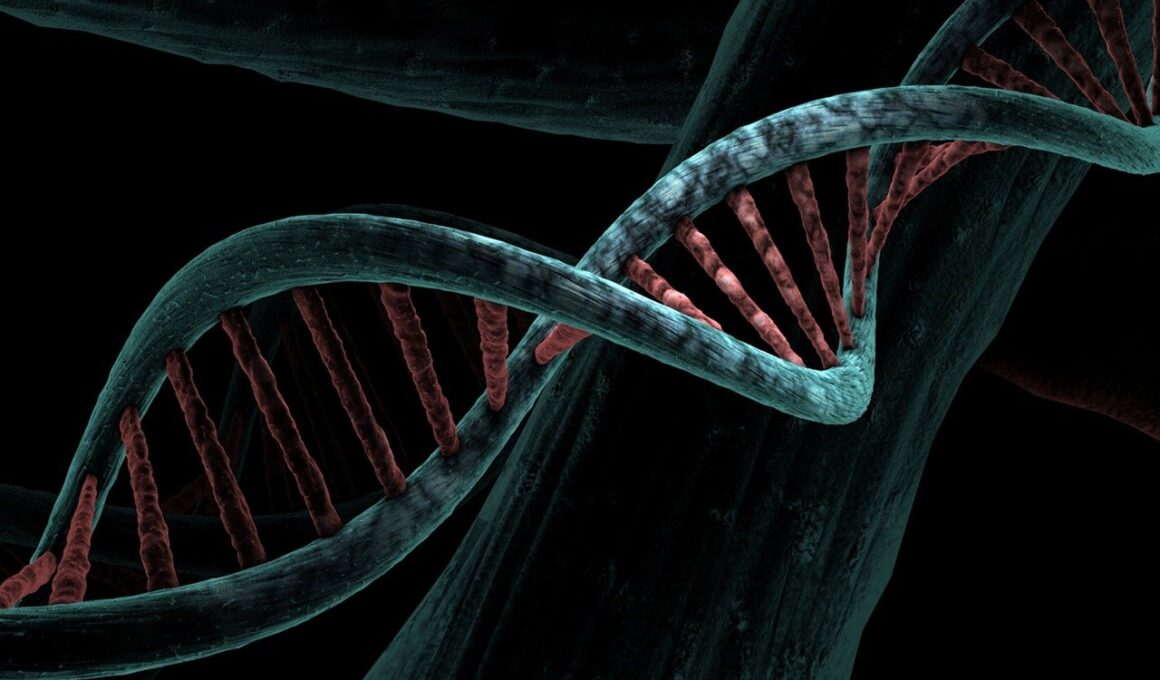Understanding Genetics and Its Influence on Nutrition Myths
The area of nutrition is often surrounded by myths, which can confuse individuals trying to improve their health. One prevalent myth is that genetics plays a negligible role in nutritional outcomes. In truth, genetics significantly influences how individuals metabolize nutrients and respond to dietary changes. Genetic variations can affect metabolic rates, food preferences, and even nutritional deficiencies. For example, certain populations may be predisposed to lactose intolerance due to genetic factors, shaping their dietary habits. Moreover, understanding these genetic predispositions can enhance the effectiveness of personalized nutrition plans. This approach allows for dietary recommendations that cater to individual genetic profiles, offering more precise outcomes than generalized advice. By acknowledging the genetic component of nutrition, we can debunk myths, such as ‘one diet fits all’. Instead, recognizing the importance of genetics facilitates the development of tailored nutrition strategies based on unique genetic make-up. This shift could lead towards better health outcomes, effective weight management, and improved overall well-being. Therefore, educating the public about the influence of genetics on nutrition is crucial in dispelling myths and providing science-backed guidance for achieving optimal health.
Another myth is the belief that genetics alone determines one’s health and dietary needs. While genetics undoubtedly influences nutrition, lifestyle choices, and environmental factors equally play pivotal roles. The interplay between genes, lifestyle, and environment is complex and multifaceted. For instance, even individuals with a genetic propensity for obesity may maintain a healthy weight through diligent exercise and mindful eating. On the other hand, someone without a genetic predisposition to such issues might struggle with weight if they adopt an unhealthy lifestyle. This emphasizes the importance of a holistic view of nutrition, integrating genetics with lifestyle modifications to achieve health goals. To unravel these complexities, more research is essential. Recognizing that genetics lays the foundation for health while lifestyle choices shape the final outcome is key. Individuals should focus not merely on their genetic predispositions but also on cultivating habits that foster better health. With appropriate information, individuals can make informed dietary choices irrespective of their genetic backgrounds, creating a proactive approach toward nutrition. Consequently, this dynamic highlights the need for an informed public, dismantling the myths surrounding genetics and nutrition, promoting better health practices for everyone.
The Interaction Between Genetics and Environment
Many nutrition myths oversimplify the relationship between genetics and health. A common misunderstanding is that eating certain foods will universally lead to specific health outcomes. However, an individual’s genetic makeup interacts with environmental factors, which significantly influence how that person reacts to different foods. For example, individuals may have varying responses to a high-fat diet based on their unique genetic variations. Those with specific gene variants may be more vulnerable to adverse health effects from such a diet. This interaction signifies that a one-size-fits-all approach is inefficient and can foster harmful dietary practices. Furthermore, understanding this interplay is crucial in demystifying myths surrounding food consumption, such as misconceptions about superfoods. These foods may offer health benefits, yet individual genetic differences dictate how effectively they impact various people. Moreover, research continues to unveil how environmental influences, such as socioeconomic status and cultural background, can also shape nutritional needs and food choices. Thus, by taking genetics and environment into account, we can better tailor dietary recommendations to suit individual needs and provide accurate information that counters prevalent nutrition myths.
Aside from the influence of genetics on food metabolism, several genetic factors impact nutrient requirements, leading to widespread myths in nutrition. For instance, some individuals might believe that everyone has the same daily requirement for essential nutrients, such as vitamins and minerals. However, genetic differences can result in varying nutrient needs across individuals. Certain gene variants can affect nutrient absorption and utilization in the body, making it essential to recognize these variations. For example, some individuals may require higher levels of vitamin D due to genetic factors affecting its metabolism. Consequently, myths surrounding universal nutrient recommendations should be dispelled to enhance nutritional awareness. Personalizing nutrient intake based on an individual’s genetic profile would lead to improved health outcomes. Personalized nutrition has gained traction in recent years, with advancements in genetics paving the way for tailored dietary strategies. By debunking common myths about nutrient needs, individuals can make more informed dietary choices that align with their genetic requirements. Ultimately, educating people about differences in nutrient requirements can foster better health and broaden understanding regarding the complexities of nutrition based on genetic variability.
The Role of Genetic Testing
With the growing interest and accessibility of genetic testing, individuals are often led to believe that these tests can provide definitive answers about their diet and health. While genetic testing can offer insights, it is essential to understand the limitations and avoid falling prey to oversimplified interpretations. Many genetic tests focus on specific markers that may indicate predispositions to certain health issues or dietary reactions. However, these markers are only one piece of the puzzle, as nutrition is influenced by various factors including environment and lifestyle. This means that relying solely on genetic test results can perpetuate misconceptions and flawed dietary practices. It is vital to interpret genetic testing results within a broader context of health. Instead of viewing genetic tests as a prescription for specific diets, they should be seen as a tool for promoting informed choices alongside other lifestyle factors. To navigate through this evolving landscape, proper education and guidance are necessary to help individuals understand how to utilize genetic testing effectively without succumbing to detrimental myths. This will lead to better-informed dietary choices and holistic health management practices for everyone.
Another pervasive myth within the realm of nutrition is that certain diets or foods can ‘change’ your genetics. While lifestyle choices can influence gene expression through epigenetics, they do not change the underlying DNA sequence. These misconceptions can create unrealistic expectations about what diet alone can achieve. For example, following a trendy diet may promise to rewrite one’s genetics and improve health outcomes drastically, but this is misleading. Instead, individuals should focus on how nutrition can support gene expression positively. Understanding that genetic factors create a foundation for health can lead to more responsible dietary choices. Balancing macronutrients and focusing on whole foods can facilitate healthier gene expression. Adopting anti-inflammatory diets or consuming antioxidant-rich foods can create favorable conditions for genetic expression. Hence, individuals can shape their health trajectory by making informed food choices that promote overall well-being without replacing or changing their genetic makeup. By clarifying these concepts, we can combat myths that misrepresent the relationship between diet and genetics, fostering healthier practices and understanding in the public domain.
Conclusion: Embracing a Comprehensive View of Nutrition
In conclusion, understanding the role of genetics in nutrition is crucial for dispelling prevalent myths and misconceptions. Genetics indeed influences various aspects of nutrition, including metabolism, nutrient needs, and dietary responses. However, it is essential to balance this knowledge with lifestyle and environmental factors that dramatically impact health. The intersection of genetics and nutrition highlights the necessity for personalized approaches in dietary planning. By educating individuals about these connections, we can dismantle the myths that often hinder effective dietary choices. Emphasizing the importance of evidence-based information and personalized nutrition can lead to improved health outcomes and promote informed decision-making. The collaborative effort of healthcare professionals, educators, and researchers will be vital in ensuring a well-rounded understanding of nutrition’s complexities. Additionally, as more individuals seek to optimize their health, embracing a comprehensive view of nutrition and genetics will foster a culture of informed dietary practices. Combating inaccurate beliefs surrounding nutrition and genetics will pave the way for healthier lifestyles and overall well-being for diverse populations. Together, we can work towards eradicating myths in the nutrition landscape, promoting greater understanding and healthier futures for everyone.
In summary, the relationship between genetics and nutrition is complex and multifaceted, involving various interactions that shape health outcomes. By debunking myths and misconceptions about genetics, we empower individuals to make well-informed dietary choices. It is imperative to foster a culture where education on scientific advancements in genetics and nutrition is prioritized. Integrating this knowledge into our daily lives can significantly enhance the understanding of personal dietary requirements. Continued research will likely uncover more about how our genetics play a role in nutrition, and how we can fully realize its benefits. Emphasizing the importance of a personalized approach to nutrition can help individuals navigate the sea of information available on these topics. This effort requires collaborative work from healthcare professionals, researchers, and individuals committed to improving health. Together, effective strategies can be developed that support diverse needs while effectively addressing myths regarding nutrition. By shifting focus from generalized dietary beliefs to personalized strategies, we can cultivate greater health literacy. Ultimately, removing barriers of misunderstanding will create a healthier society, where genetic knowledge is leveraged for better nutrition, ensuring everyone can thrive and lead healthier lives.


